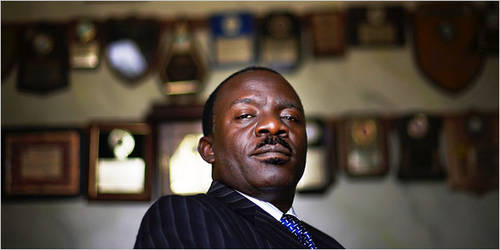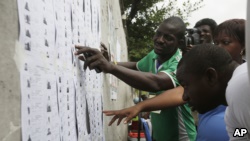Buhari’s Government Not Winning Anti- Corruption War – Falana
T he Nigerian government is not yet winning the war
on corruption despite the overwhelming evidence
available to it, human rights lawyer, Femi Falana,
has said.
The Nigerian government is not yet winning the war
on corruption despite the overwhelming evidence
available to it, human rights lawyer, Femi Falana,
has said.
Delivering the keynote speech at a round table on
“Winning the War Against Corruption” in Lagos,
Thursday, Mr. Falana said the federal government
was yet to understand that the anti-corruption
battle could not be won through regular courts.
“Apart from the class solidarity usually extended to
politically exposed persons by judges in all
capitalist societies, the situation is compounded in
Nigeria by judicial corruption and professional
misconduct on the part of senior lawyers involved
in the defence of corruption cases,” said Mr. Falana,
a Senior Advocate of Nigeria.
“Owing to lack of coordination in the trial of
politically exposed persons, corruption is fighting
back. Painfully, the federal government is on the
defensive as it has failed to counter the deliberate
manipulation of the criminal justice system by the
indicted looters of the public treasury.”
Mr. Falana, who was represented by Wahab Shittu,
accused the regular courts of subjecting corruption
and drug related cases to frivolous adjournments,
rather than hearing them day by day as stipulated
by the Administration of Criminal Justice Act 2015.
“As if that is not enough, the suspects are being
granted bail in their own recognizance or other
ridiculously liberal terms by trial judges
notwithstanding the gravity of the offences allegedly
committed by them.
“Some other judges are granting interlocutory or
perpetual injunctions to restrain the anti-graft
agencies and the police from arresting,
investigation and prosecuting politically exposed
persons.
“The ban on granting of stay of proceedings by the
Administration of Criminal Justice Act, 2015, is not
being observed by the courts.”
Mr. Falana also said most of the ongoing corruption
cases would not be concluded before 2019.
“Even if the defendants are convicted, the cases will
be pursued up to the Supreme Court,” he said.
“If the current trend continues, some of the cases
will not be concluded in the next 10 years.
Therefore, the federal government should review
the anti-corruption policy with a view to setting up
a Special Anti-Corruption Court to try all economic
and financial crimes including corruption.”
The lawyer canvassed for the establishment of
Special Courts to specifically handle cases of
corruption, terrorism, drug trafficking, human
trafficking, advanced fee fraud, and other economic
crimes.
“At the end of the four years of the Buhari
administration, the success of the anti-corruption
policy will not be measured by the number of
arrests or investigations carried out by the anti-
graft agencies,” Mr. Falana said.
“If the status quo remains unchanged, the Nigerian
people and the international community will blame
the administration for its inability to secure the
conviction of corrupt politically exposed persons
with all the evidence at its disposal.
“Therefore, a special court ought to be established
to deal specifically with economic and financial
crimes as well as electoral offences. Otherwise, the
anti-corruption policy of the federal government
will not achieve its desired objectives.”



Comments
Post a Comment